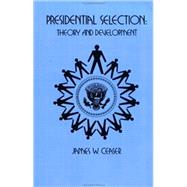Presidential Selection
, by Ceaser, James W.- ISBN: 9780691021881 | 0691021880
- Cover: Paperback
- Copyright: 6/1/1979
Examining the development of the process of presidential selection from the founding of the republic to the present day, James Ceaser contends that many of the major purposes of the selection system as it was formerly understood have been ignored by current reformers and modern scholars. In an attempt to reverse this trend, Professor Ceaser discusses the theories of selection offered by leading American statesmen from the Founders and Thomas Jefferson to Martin Van Buren and Woodrow Wilson. From these theories he identifies a set of criteria for a sound selection system that he then uses to analyze and evaluate the recent changes in the selection process. Five normative functions of a presidential selection system comprise the author's criteria: it should minimize the harmful effects of ambitious contenders for the office, promote responsible executive leadership and power, help secure an able president, ensure a legitimate accession, and provide for an appropriate amount of choice and change. Professor Ceaser finds that the present system is characterized by weak parties and candidate-centered campaigns that lead to the problems of "image" politics and demagogic leadership appeals. He therefore argues for a more republican selection system in which political parties would be strengthened to serve as a restraining force on popular authority, public opinion, and individual aspirations for executive power.







